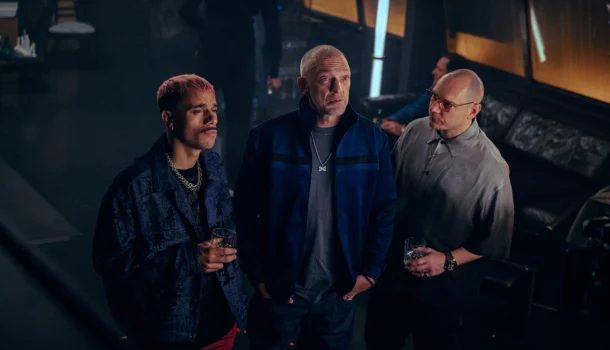There is something profoundly unsettling — and at the same time fascinating — about the insistence on dancing amid ruins. “Banger”, directed by So-Me, doesn’t offer a depiction of cultural collapse as lament, but as an involuntary rave. The world cracks, the dance floor endures. The film settles at the edge of euphoria and decomposition, extracting from the French electronic scene an image that resembles a stubborn echo more than a living pulse. So-Me doesn’t document; he distorts, amplifies, caricatures with surgical precision. The result is a twilight carnival, where laughter is nervous and neon bleeds irony.
At the eye of this storm is Scorpex, a dusty DJ portrayed by Vincent Cassel with a blend of disguised vanity and chronic disorientation. But the protagonist isn’t in crisis — he is the crisis itself, wrapped in leather and nostalgia. Rather than take the predictable route of melancholic reflection, So-Me throws him into a spiral of absurdities, anchored by a police investigation as misplaced as it is revealing. The plot isn’t concerned with solving the mystery, but with exposing a paradox: state authority repurposes the aesthetic corpse of club culture as a tool for surveillance. The party becomes a facade. The ego, a tactical asset. And the scratched vinyl keeps playing the same track — the delusion of relevance.
The insertion of a detective storyline isn’t a genre indulgence, but a narrative trap designed to expose the scene’s predictable excesses. What once throbbed with rupture now echoes with choreographed repetition. So-Me, a seasoned image curator since his music video days, manipulates visual language as a critical weapon. The framing doesn’t merely show — it mocks. The lighting doesn’t illuminate — it exposes. It’s an aesthetic that detonates in the viewer like poisoned confetti — beautiful to behold, bitter to digest.
Vestax, played by Mister V, embodies a youth so consumed by the desire for novelty that it becomes incapable of recognizing its own clichés. The tension between him and Scorpex goes beyond a generational clash; it’s the friction between a simulation of the future and a zombie from the past. While one parades arrogance as symbolic capital, the other spins pointlessly, like a sample that can’t find its beat. And in that collision lies the real battlefield: not sound, but the perception of time. Laura Felpin, meanwhile, plays Agent Rose with a mix of performative chaos and offbeat clarity. She’s not there to mediate — she’s there to stir things up, as if to say: if the party’s over, we might as well turn it into a glorious fire.
Nonsense here is treated as a method. Nothing is gratuitous. Laughter, when it comes, is not an escape but an accusation. So-Me conducts exaggeration like a disobedient maestro, leading a dissonant symphony that refuses to fall into easy burlesque. There is formal intelligence in the chaos, precision in the absurd. The film constantly flirts with collapse — and that risk is where it finds its rhythm. The feeling is that no one is dancing together, and perhaps that is the only genuine gesture in a space where spontaneity has been hijacked by self-marketing.
The soundtrack, in turn, plays a double role: it soothes and accuses. It’s the sonic mirror of authenticity’s illusion. Rather than passively follow the scenes, it strains them. Kavinsky and others aren’t there to create ambience, but to satirize it. The musical curation functions as meta-commentary: it points to the addiction to aesthetic recycling, the fetishization of repetition sold as style. The sound here is less atmosphere than argument — each beat carries the memory of another, already heard, already digested, already discarded.
Far from limiting itself to a satire of a generation lost in self-absorption, “Banger” lays bare the mechanics of stubborn error. It’s a festive autopsy of a universe that refused to evolve because it fell in love with its own reflection. So-Me doesn’t judge with moralism but with bitter irony. His camera, caught between sarcasm and disillusionment, unmasks a culture that prefers noise to listening, flash to substance, performance to presence. Everything is there — including the void.
And perhaps that’s the film’s most provocative proposition: recognizing that ruin is the natural stage of a time that no longer distinguishes relevance from persistence. So-Me doesn’t mourn the party’s end. He asks whether it ever truly began. And by doing so with corrosive humor, formal rigor, and critical intelligence, he turns the wreckage into a stage — not for celebration, but to mock the very impulse to celebrate.
Film: Banger
Director: So-Me
Year: 2025
Genre: Comedy
Rating: 7/10

